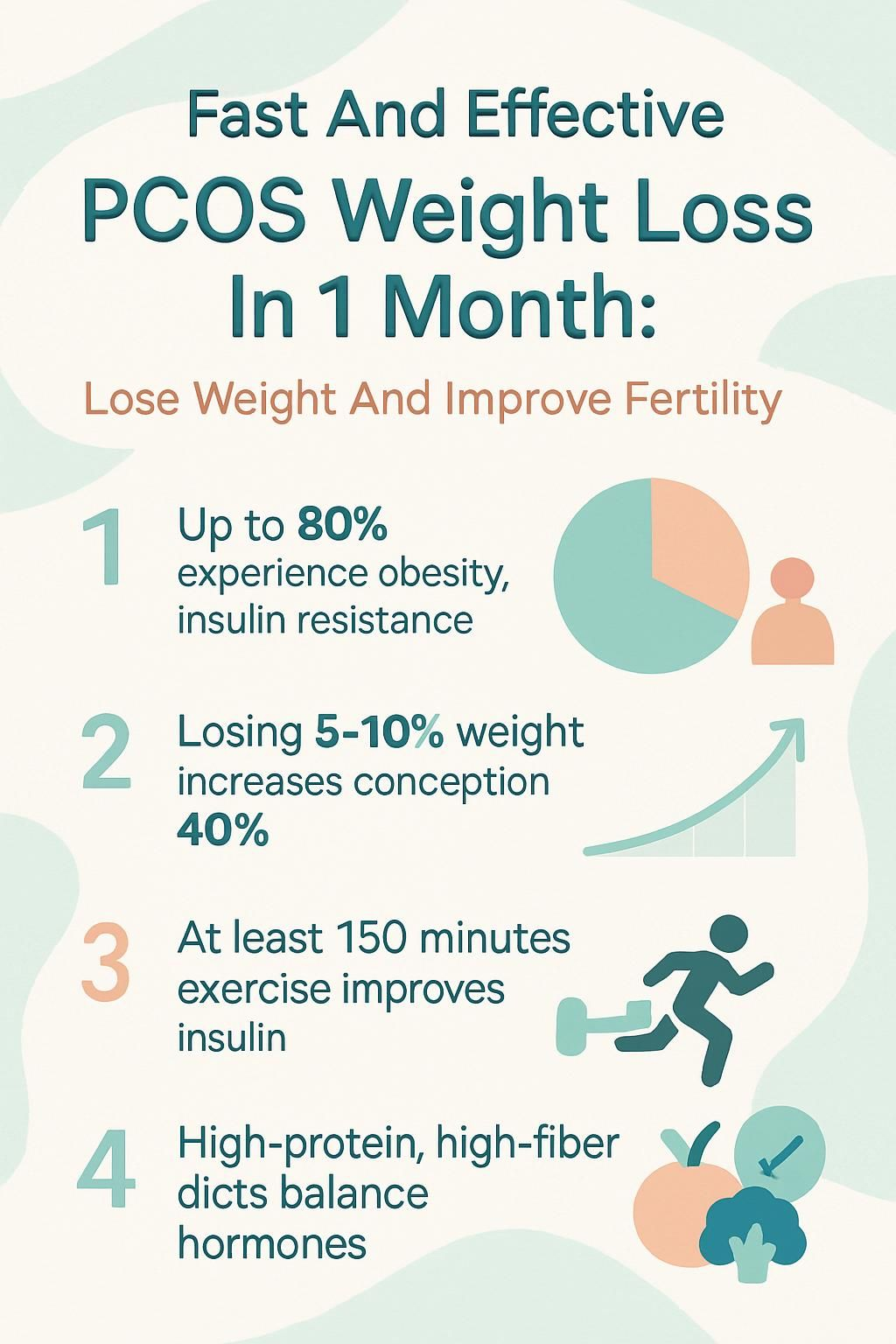Fast And Effective PCOS Weight Loss In 1 Month: Lose Weight And Improve Fertility
Our Nutrition Assistant AI Suite will transform your body. You will lose fat, get toned, and build muscle. Gain confidence and optimal health.
If losing weight with polycystic ovary syndrome feels impossible, you are not alone. PCOS weight loss is harder because insulin resistance, a reduced response to the hormone insulin, drives hunger and fat storage.
This guide on Pcos Weight Loss In 1 Month shares proven steps to help you lose weight and support fertility. Use these practical strategies to take control of your health starting today.
Key Takeaways
- Up to 80 percent of women with PCOS face obesity and insulin resistance, so targeted diet and exercise plans matter.
- Losing 5 to 10 percent of body weight can restore ovulation and may raise the chance of conception within six months.
- High protein and high fiber, with fewer processed foods and added sugar, support hormones and steady fat loss.
- At least 150 minutes of weekly exercise, including strength training or HIIT, improves insulin sensitivity and reduces belly fat.
- Short crash diets rarely last. Consistent habits, quality sleep of 7 to 9 hours, and stress control produce better long-term results.

PCOS and Effective Weight Loss Strategies

Progress is possible with a plan that works with your biology, not against it. Understanding PCOS makes weight loss feel more achievable.
What is PCOS and How Does It Affect Weight?
Polycystic ovary syndrome is a hormone disorder affecting up to 10 percent of women of reproductive age. It often includes high androgens, male hormones present in all women, and insulin resistance that disrupts blood sugar control.
These changes can cause irregular periods, unwanted hair growth, acne, and stubborn weight gain. Higher insulin can push the body to store more fat around the abdomen. It can also increase hunger and cravings for refined carbs and sweets.
Many people with PCOS gain weight even with healthy habits. In research supported by the National Institutes of Health, roughly 80 percent of those with PCOS are overweight or have obesity. Knowing the drivers behind weight gain helps you choose smarter strategies that fit PCOS.
Why is Weight Loss Difficult with PCOS?
PCOS may slow metabolism and raise insulin, which signals the body to store fat. High insulin also leads to more frequent hunger, so extra calories add up fast.
Higher testosterone can promote belly fat. Insulin resistance makes cells less able to use blood sugar for energy, so more glucose is stored as fat. This pattern raises risks for type 2 diabetes and heart disease if left unchecked.
Typical diet plans might deliver smaller results because hormone signals for appetite and energy use are disrupted. A PCOS-aware approach works better.
How Does Losing Weight Improve Fertility?
Even a modest drop in weight, about 5 to 10 percent, can bring back ovulation for many women with PCOS. Lower insulin and lower androgens help regulate menstrual cycles and improve egg release each month.
More regular cycles often mean a higher chance of conception, including with fertility treatments. In one client example, shifting to balanced meals with protein and fiber plus regular walks led to predictable cycles within a few weeks.
Small, steady changes to eating and movement support better metabolic health and may raise the odds of pregnancy within months.
Holistic Approaches for Managing PCOS
A whole-person plan makes each part of your routine work together like a team.
How to Combine Diet, Exercise, and Lifestyle Changes?
Combining nutrition, movement, and daily habits creates the best path to sustainable weight loss in PCOS. Use this checklist to get started.
- Build meals around whole foods, lean protein, healthy fats like olive oil and nuts, and high fiber for steady appetite control.
- Cut back on processed foods and added sugar, which raise inflammation and disrupt hormones.
- Track carbohydrates. Many do well with a lower carbohydrate pattern such as a Mediterranean style approach.
- Exercise at least 150 minutes each week. Mix high-intensity interval training and strength work to improve insulin sensitivity.
- Protect sleep, aiming for 7 to 9 hours nightly to support appetite hormones and recovery.
- Manage stress with yoga, brief mindfulness sessions, or breathing drills to lower cortisol, a stress hormone.
- Drink water regularly, about 8 to 10 cups daily, to support metabolism and appetite control.
- Monitor progress beyond the scale. Notice body composition changes and how clothes fit.
- Work with a registered dietitian who understands PCOS for a personalized plan.
- Skip extreme diets. Choose habits you can keep for months and years.
How to Balance Hormones for Better Weight Loss Results?
Balanced hormones make weight loss more predictable. Build each meal with protein, such as eggs, fish, or chicken, plus fiber from vegetables or whole grains. This supports stable blood sugar and reduces cravings.
Limit processed foods and sugar to keep insulin and appetite signals steady. Add moderate exercise like brisk walking and regular strength sessions to lower androgens and support ovulation. Manage stress with short daily practices, and prioritize 7 to 9 hours of high-quality sleep to reset hunger hormones leptin and ghrelin.
Hydration supports normal hormone function and fat loss. Consistent habits across food, movement, sleep, and stress work together for better results.
Dietary Recommendations for PCOS Weight Management
A focused PCOS diet supports steady energy, healthy weight, and fertility. Small daily choices add up.
Should I Lower Carbohydrate Intake for PCOS?
Many people with PCOS benefit from reducing refined carbohydrates, such as white bread, pastries, and sugary snacks. Insulin resistance is common in PCOS, and fewer fast-digesting carbs can help stabilize blood sugar.
A plan richer in protein and healthy fats, with fiber from vegetables and whole grains, can improve hormones and hunger control. Swap refined options for whole foods to keep energy steady and curb cravings.
How Can Increasing Fiber Help with PCOS Weight Loss?
Fiber increases fullness, which helps reduce overeating and sugar spikes. It also slows how fast sugar enters the blood, a major win for insulin resistance.
Many women notice better weight control when they reach at least 25 grams of fiber per day. Good sources include vegetables, fruit, legumes, nuts, seeds, and whole grains. For example, oatmeal with berries at breakfast can keep you satisfied until lunch.
What Are the Best Healthy Fats for PCOS Diets?
Choose avocados, nuts, seeds, fatty fish, and extra-virgin olive oil. Fatty fish like salmon and trout supply omega-3s that support heart health and reduce inflammation. Olive oil provides monounsaturated fats that also protect the heart.
Chia and flaxseeds offer omega-3s plus fiber. Nuts add both protein and healthy fat, which helps control hunger. Swapping chips for a small handful of almonds can cut cravings without a crash.
How Much Protein Should I Eat to Manage PCOS?
Protein improves fullness and blood sugar control. A helpful target is 20 to 30 grams of protein at each meal, and about 0.8 to 1 gram per kilogram of body weight per day for most adults.
Pick lean meats, eggs, fish, Greek yogurt, tofu, beans, or lentils. Whole foods tend to be more satisfying and nutrient dense than processed meats. A consistent protein intake can make a noticeable difference in energy and appetite.
Which Processed Foods and Sugars Should I Avoid?
Highly processed foods and added sugars can spike insulin and worsen symptoms of PCOS. Reducing them often improves weight, skin, and energy.
- Avoid sugary drinks like soda, sweet tea, and energy drinks that raise blood sugar quickly.
- Limit white bread, pastries, and refined-flour crackers that cause sharp glucose swings.
- Skip packaged snacks such as chips and flavored popcorn that contain poor-quality fats and additives.
- Reduce candies, desserts, ice cream, and sweet baked goods that drive cravings.
- Limit processed meats like bacon, hot dogs, and deli meats that are high in salt and preservatives.
- Watch frozen meals and instant noodles that are often high in sodium and added sugar.
- Choose plain yogurt and unsweetened plant milks instead of flavored versions with added sugar.
- Be cautious with breakfast bars and granola bars that seem healthy but are high in sugar.
- Check sauces and dressings for hidden sugars. Use olive oil, vinegar, or simple homemade blends.
- Limit fast food meals that mix refined carbs and processed fats, which hinder progress.
How Do Fermented Foods Benefit PCOS Weight Management?
Fermented foods like yogurt, kefir, sauerkraut, kimchi, and miso provide probiotics, helpful bacteria that support gut health. A healthier gut may reduce inflammation and improve insulin sensitivity.
Better gut balance can lower cravings and support weight goals. Some studies show probiotics can modestly improve body mass index in people with metabolic issues, including PCOS. Add a serving of fermented food daily to complement a protein and fiber-rich diet.
Exercise Options for PCOS-Related Weight Loss
Movement acts like a reset button for insulin sensitivity and mood.
What Are the Exercise Benefits for PCOS?
Regular activity improves how your body uses insulin, which reduces fat storage and supports stable blood sugar. Even a brisk walk after meals helps.
Consistent exercise can lower androgens and improve symptoms like unwanted hair growth and acne. Public health guidance suggests 150 minutes of moderate activity each week for better health. Many people also notice better sleep, less stress, and more motivation to stick with healthy eating.
How Does High-Intensity Interval Training Help PCOS?
High-intensity interval training, or HIIT, uses short bursts of hard effort followed by brief recovery. Research suggests HIIT may improve insulin resistance more than steady cardio for some people with PCOS.
Two or three 20-minute HIIT sessions per week can support fat loss and better blood sugar control. Studies also report improved sex hormone binding globulin and lower testosterone, which supports ovulation and fertility.
What Strength Training Routines Are Best for PCOS?
Strength training builds muscle, which raises resting metabolism and supports long-term weight management. Aim for two or three sessions per week using free weights, resistance bands, or bodyweight.
Focus on compound moves like squats, lunges, push-ups, and deadlifts. Pair strength work with protein-rich meals to support recovery and lean mass. If energy is low, shorter sessions still help. Discuss any medication changes with your clinician, especially if you use metformin.
Can Low-Impact Activities Like Yoga Aid PCOS Weight Loss?
Low-impact activities, such as yoga or Pilates, reduce stress and support hormone balance. Lower cortisol can make fat loss and insulin control easier.
Studies show yoga three times a week for 12 weeks can lower testosterone, improve cycles, and reduce body mass index.^1 Gentle movement also aids sleep and mood, key factors for consistent progress. Group classes can provide social support and accountability.
…
^1: Study Reference – Nidhi R et al., “Effect of Yoga Intervention on Polycystic Ovary Syndrome,” International Journal of Yoga, 2012
Lifestyle Modifications to Enhance Weight Loss
Daily habits create the base layer for every result you see.
Why is Quality Sleep Important for PCOS Weight Loss?
Sleep supports healthy hormone signals for appetite and stress. Short sleep raises cortisol and insulin, which makes fat loss harder and cravings stronger.
Getting 7 to 9 hours a night helps balance leptin and ghrelin, hormones that manage hunger and fullness. Better sleep also improves energy for workouts and helps control emotional eating.
What Are Effective Stress Management Techniques?
Stress can disrupt hormones and stall progress. Use simple practices to calm your system and protect your routine.
- Practice deep breathing for five minutes daily to lower cortisol and promote recovery.
- Move your body most days. Brisk walking or yoga improves mood and reduces stress chemicals.
- Limit caffeine and ultra-processed foods that can spike anxiety and cravings.
- Try mindfulness or short meditation to boost focus and follow-through.
- Schedule quiet time to read, listen to music, or journal to prevent emotional eating.
- Connect with supportive friends or a group that understands PCOS challenges.
- Track stress triggers along with meals and workouts to see patterns.
- Seek counseling if stress feels constant or overwhelming. Professional tools help.
How Much Hydration is Needed for Weight Loss with PCOS?
Water supports appetite control, digestion, and normal metabolism. Aim for 8 to 10 cups, about 2 to 2.5 liters, each day. Increase intake with intense exercise or hot weather.
Drinking water before meals can reduce cravings for sugary drinks. Carry a bottle, and use an app or journal to track progress. Hydration works best alongside balanced meals and regular movement.
Why Avoid Short-Term Diets for Long-Term Weight Loss Success?
Very restrictive diets often slow metabolism and reduce muscle. Weight usually returns after the diet ends, sometimes with interest.
In contrast, steady habits help hormones settle and support fertility. A diet rich in fiber, healthy fats like nuts, and protein creates stable energy. Prescription weight loss medication may help in select cases, but lifestyle remains the foundation. Ask your healthcare provider about options that fit your health history.
Fertility Enhancement through Weight Loss
Even small weight changes can improve ovulation and pregnancy outcomes in PCOS.
How Does Weight Loss Affect Ovulation in PCOS?
Losing 5 to 10 percent of body weight can lower insulin and rebalance hormones like testosterone and estrogen. Cycles often become more regular, which supports ovulation.
Some people notice fewer skipped periods within weeks of changing diet and activity. These shifts can also support treatments such as assisted reproductive technology.
How Can Healthy Habits Regularize Menstrual Cycles?
Balanced meals with fiber, protein, and healthy fats help control insulin. That stability supports more predictable cycles.
Try brisk walking, strength training, or yoga at least three days weekly. Aim for 7 to 9 hours of sleep, and use stress tools like breathing or journaling. Consistent routines often lead to more regular periods over time and better fertility outcomes.
How Does Weight Loss Improve Egg Quality and Fertility?
Weight loss can improve how your ovaries respond to hormones. Regular ovulation becomes more likely, and egg quality may improve.
Many see brighter, more regular cycles after cutting processed foods and adding healthy fats and protein. If lifestyle shifts are not enough, talk with your clinician about medicines such as metformin or GLP-1 therapies. Progress, even if steady and slow, supports a better chance of pregnancy.
Overcoming Common Weight Loss Barriers
Barriers happen. The right tools help you keep moving forward.
How to Break Through Weight Loss Plateaus with PCOS?
Plateaus are normal, especially with PCOS. Small changes can restart results.
- Use calorie cycling. Adjust your daily calories slightly every few days.
- Change workout intensity or duration. Add HIIT or modify your strength plan.
- Increase protein at meals to tame hunger. Aim for 20 to 30 grams each time.
- Hunt for hidden sugar and refined carbs that cause insulin spikes.
- Add more fiber from vegetables, seeds, and whole grains.
- Protect 7 to 9 hours of sleep to control cortisol and insulin resistance.
- Recheck hydration. Aiming for 2 liters or more can reduce cravings.
- Lower stress with mindfulness, yoga, or a short walk outside.
- Track data weekly with a journal or app. Adjust based on trends.
- Ask your clinician about supplements like inositol or the role of metformin.
- Discuss bariatric surgery if severe obesity limits progress despite all efforts.
How to Stay Consistent with Your Weight Loss Routine?
Consistency beats intensity. Build a simple system you can repeat on busy days.
- Set clear daily goals that fit your schedule and energy.
- Use a planner or app to schedule meals, workouts, and hydration.
- Prep snacks such as nuts, seeds, fruit, or yogurt for steady energy.
- Cook more at home to limit hidden sugar and low-quality fats.
- Anchor workouts to the same time each day to form a habit.
- Find support from a friend, coach, or PCOS community.
- Celebrate small wins with non-food rewards.
- Place reminders on the fridge or pantry to skip sugary drinks.
- Sleep at least seven hours to help with hunger and stress control.
- Tell your provider if medicines affect appetite so you can adjust.
- Share your goals with family before events to support smart choices.
A short weekly meal plan can prevent last-minute decisions that lead to fast food. Even a 20-minute prep session on Sunday can set the tone for the week.
What Are Strategies to Manage Emotional Eating?
Emotional eating is common with PCOS. A few simple tools can reduce overeating and improve control.
- Track mood and food in a journal to spot triggers.
- Keep nutrient-dense snacks on hand, such as Greek yogurt or veggie sticks.
- Use mindful eating, slow down, and notice when you feel satisfied.
- List non-food coping skills like a short walk, music, or breathing drills.
- Plan meals and snacks on a schedule to avoid impulsive choices.
- Set weekly goals you can meet, and build confidence with each success.
- Lean on trusted friends or a support group for accountability.
- Practice self-compassion after slipups, and focus on the next choice.
- Drink water first if hunger hits suddenly, since thirst can mimic hunger.
Supplements and Medicinal Support for PCOS
Some supplements and medications can help, but they should support, not replace, lifestyle changes. Always speak with your healthcare provider before starting any new product.
Which Supplements Like Inositol and Omega-3 Help PCOS?
Myo-inositol and D-chiro-inositol may improve insulin sensitivity and support regular ovulation in PCOS. Many studies use 2 to 4 grams daily, often over several months.
Omega-3 fatty acids from fish oil or plant sources can reduce inflammation and improve triglycerides. Consistent use works best alongside a balanced diet and exercise routine.
When Should Metformin or Other Medications Be Used?
Metformin is often considered if diet and exercise are not enough to manage symptoms or blood sugar. It can improve insulin resistance, support cycle regulation, and help with modest weight reduction.
Some people also benefit from GLP-1 receptor agonists prescribed by a clinician. Your provider will match treatment to your health history and goals. Regular follow-up helps tailor the dose and monitor side effects.
What Surgical Options Exist for PCOS Weight Management?
Bariatric surgery, such as gastric bypass or sleeve gastrectomy, may be an option for severe obesity. Surgery often improves insulin sensitivity and lowers androgens, which can lead to more regular cycles.
Candidates usually have a body mass index over 40, or over 35 with conditions like diabetes or sleep apnea. Surgery is a serious choice and works best with ongoing nutrition and exercise support.
Frequently Asked Questions
Here are clear answers to common questions about PCOS weight loss and fertility.
Can You Lose Weight with PCOS in One Month?
Yes, progress is possible. With steady changes like cutting sugary foods, adding fiber, and exercising, many lose 1 to 4 pounds in a month.
Even a 5 percent drop in weight can improve symptoms and fertility markers. Track meals, activity, and sleep to see wins that the scale may miss.
What Foods Should I Avoid to Manage PCOS?
Reducing sugar and refined carbs supports hormone balance and lowers cravings. Focus on whole foods and simple ingredients.
- Skip sodas, candy, sweet cereals, and pastries that spike blood sugar.
- Limit white bread, white rice, pasta, and most baked goods.
- Cut packaged snacks like chips and instant noodles high in additives.
- Avoid fried items such as French fries and fried chicken.
- Reduce full-fat ice cream and heavy dairy if they worsen your symptoms.
- Limit red and processed meats that can raise inflammation.
- Be cautious with artificial sweeteners that may disrupt appetite signals.
- Watch breakfast bars, sugary yogurts, and flavored coffee drinks for hidden sugar.
How Does Weight Loss Improve Fertility in PCOS?
Losing 5 to 10 percent of body weight can lower insulin resistance and re-balance hormones. Cycles often become more regular, which raises ovulation rates.
Healthy eating and regular movement support better egg quality and ovarian function. Gradual, sustainable weight loss is linked with higher chances of conception for many people with PCOS.
Conclusion
Fast and effective PCOS weight loss in one month starts with simple, steady steps. Build meals with protein and fiber, reduce added sugar, move your body, sleep well, and manage stress. These habits support hormones and fertility.
Track your progress, ask for support, and speak with your healthcare provider if you need extra help. With evidence-based strategies and consistent effort, you can see meaningful changes within weeks while protecting long-term health.
Health disclaimer: This content is for education only and is not medical advice. Consult a qualified clinician for personal evaluation and treatment.
FAQs
1. What is the most effective way to lose weight with PCOS in one month?
A structured plan that combines a low-glycemic diet, regular physical activity, and medical supervision can help with weight loss in people with polycystic ovary syndrome. Studies show that reducing daily calorie intake by 500 to 750 calories may lead to a loss of 1 to 2 pounds per week. This approach also supports improved hormone balance and fertility outcomes.¹
2. How does losing weight improve fertility in people with PCOS?
Weight loss can lower insulin resistance and regulate menstrual cycles. Research indicates that even a 5 percent reduction in body weight can restore ovulation and increase the chance of pregnancy for people with polycystic ovarian syndrome.²
3. Are there specific foods to avoid or include for fast PCOS weight loss?
Limiting processed carbohydrates, sugary drinks, and fried foods helps control blood sugar levels. Including lean proteins, whole grains, vegetables, and healthy fats supports steady energy and reduces cravings. A sample meal plan may feature grilled chicken, brown rice, leafy greens, and olive oil.
4. Can exercise alone lead to fast PCOS weight loss in one month?
Physical activity plays an important role but works best when paired with dietary changes. Data from clinical trials suggest that combining aerobic exercise with strength training three to five times per week leads to greater fat loss than exercise alone.
Summary:
A focused approach using diet changes, regular exercise, and medical guidance supports fast PCOS weight loss within one month. These steps also improve fertility by restoring hormone balance and regular cycles.
References:







